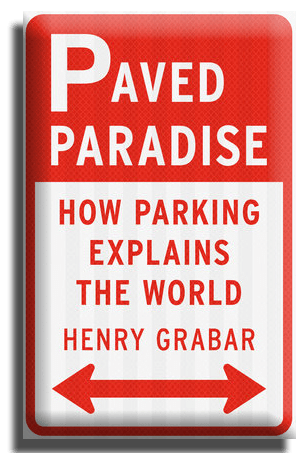
Slate's cities reporter Henry Grabar's new book, Paved Paradise: How Parking Explains the World (Penguin Press), could have been a sleeper, aimed at livable cities nerds who already know how drivers' obsessive demand for free car storage has ruined our cities and enabled sprawl, all the while devastating our air quality and congesting our roads. Instead, it's quickly becoming a media sensation that's catching the attention of people far outside the movement — and getting them talking about the need for reform.
Cars are an experiment that has failed everywhere: In Chicago, where a privatization-obsessed mayor undervalued parking spaces — and lost $1 billion in a deal with Wall Street. In Los Angeles, downtown merchants were so obsessed with "getting back" suburban shoppers that they turned their entire neighborhood into a shopping crater. In New York, city fathers decided that all the garbage should be stored on the sidewalk (in the way of pedestrians) rather than in the curb lane because too much parking would be "lost."
Every city has such a story. So on this episode of The Brake, guest host Gersh Kuntzman gabs with Grabar about some of the most shocking stories from America's long love affair with asphalt.
Tune in below, on Apple Podcasts, or anywhere else you listen.
This excerpt has been edited for clarity and length.
Gersh Kuntzman: There are a lot of stories about how parking policy has transformed America. Which do you think really stands out as a singular example of the parking saga as the overarching public enemy number one?
Henry Grabar: Well, if we just want to think about the arbitrage between the value of parking and the price of parking — which is what a lot of these issues come down to, right — it's that parking is something that nobody really wants to pay for. But if you think of that land as being possibly used for something else, then suddenly it becomes potentially very valuable to people.
And if you think about it, in those terms, Manhattan is in the league of its own, right? New York City has some of the most valuable land on the entire planet, and you can still park your car there for free. I think that that is kind of shocking when when you when you really think about it.
For listeners who aren't familiar with New York City, we have a very unique practice of putting our garbage in black trash bags piled high on the sidewalk. And one of the reasons we do that is because we are reluctant to take away curb parking spaces, to create space for containers where the trash can be picked up in containers. And the city just released this report saying, 'You know what, we could put the trash in containers — but it would cost us 150,000 parking spaces.' I think the consensus is that that's a nonstarter, we're not going to take away that many parking spaces.
We are literally living in filth. And when you put it in those terms, it just shows you how people think about parking, and their reluctance to to give that space up for any other use.
GK: Stick with the with the other uses for a second. It's very hard to get most drivers to even see the curb side lanes as public space — not just in New York, but in every city. I mean, sure, they see a bike lane every once in a while against the curb, and they see a bus lane every once in a while against the curb. But as you mentioned in the book, and we all obviously all experienced with the pandemic, there are a million other uses for that public space. Why is it so hard to get drivers to see the curbside lane as public space?
HG: Well, I mean, it's been 100 years since we decided to dedicate our curbs to car storage. So the idea that there could be anything else there is literally beyond the reach of human memory at this point.
You come across this moment in in American history, where we begin to dedicate the curb to car storage. But streets, as you know, weren't always just for moving cars and stored cars, right? Like, prior to the 1920s, there were all these different things that used to happen in the street; kids would play, people would sell things, it was a space to store construction materials, I mean, we had all kinds of different ideas about what to do with this public space. And we don't want to resurrect all of those, obviously — there was also a great deal of garbage in the street at that time. But I think the short answer to your question is that it is actually beyond the reach of human memory.
And so what we've begun to see over the last 20 years – with parklets in San Francisco, and most recently, obviously the Open Restaurants program in New York, and many, many other cities that have dedicated curb parking to restaurant space, planting trees and shrubs to soak up stormwater — I mean, all this stuff is just a blink of an eye in the whole history of the curb. And so it is going to take a while for people to adjust their expectations.






